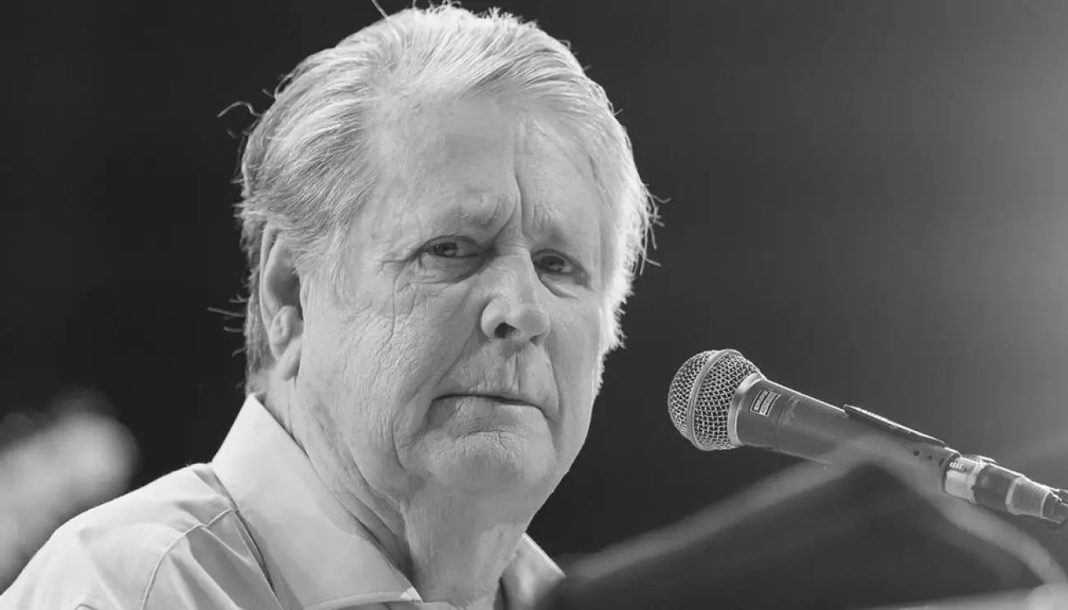Brian Wilson: Remembering the Musical Luminary of The Beach Boys
The music industry is enveloped in sorrow as it bids farewell to Brian Wilson, the legendary figure behind The Beach Boys, who passed away at the age of 82. His innovative spirit and extraordinary contributions to the realm of popular music have left an indelible mark, shaping not just the sound of the 1960s but also influencing generations of musicians who followed. Wilson’s legacy is a testament to a unique blend of artistic ambition, emotional depth, and the quest for creative perfection.

A Revolutionary Musical Visionary
Brian Douglas Wilson was born on June 20, 1942, in Inglewood, California. From a young age, he exhibited an extraordinary affinity for music, captivated by the harmonies and melodies that would later define his work. Growing up in a household influenced by complex musical elements, Wilson spent countless hours honing his craft, immersing himself in the music of groups such as the Four Freshmen. This early dedication fueled his ambition to redefine the norms of pop music.
In 1961, alongside his brothers Dennis and Carl Wilson, cousin Mike Love, and friend Al Jardine, Wilson co-founded The Beach Boys. They began as a local California band, quickly transforming into a global phenomenon. Their debut single, “Surfin’,” released when Wilson was just 19, encapsulated the burgeoning surf culture of California, marking the inception of their signature sound. By the time the group signed with Capitol Records in 1962, they had already carved a niche as one of the first rock acts on the label.
Defining the California Sound
Wilson’s creativity flourished throughout the early and mid-1960s, as he began to explore themes that extended beyond the typical surf and car motifs that characterized their initial successes. Songs like “I Get Around,” “California Girls,” and “Help Me, Rhonda” revealed a depth of songwriting that intertwined catchy melodies with intricate harmonies and innovative arrangements. Wilson’s approach to music production was revolutionary; he was among the first to utilize the recording studio as an instrument itself, layering tracks and employing unconventional sounds to craft rich, textured sonic experiences.
His pioneering work laid the groundwork for what would become known as the California Sound, characterized by lush melodies, vocal harmonies, and intricate instrumentation. The Beach Boys quickly rose to superstardom, achieving numerous Top 10 hits and capturing the hearts of millions worldwide. For Wilson, however, the pursuit of commercial success took a backseat to his ambition to elevate popular music into something more profound and artistic.
Pet Sounds: A Milestone in Music History
Wilson’s most significant artistic achievement came in 1966 with the release of “Pet Sounds,” an album that is frequently hailed as one of the greatest records ever made. This groundbreaking work pushed the boundaries of songwriting and production, featuring orchestral arrangements, complex chord progressions, and deeply introspective lyrics that explored themes of love, loss, and existential reflection. Tracks like “Wouldn’t It Be Nice,” “God Only Knows,” and “Caroline, No” marked Wilson’s evolution into a composer capable of expressing profound emotions while maintaining accessibility.
The impact of “Pet Sounds” was immediate and enduring; it not only shaped the artistic direction of The Beach Boys but also inspired countless musicians, including The Beatles, who acknowledged its influence in creating their own seminal work, “Sgt. Pepper’s Lonely Hearts Club Band.” However, the pressures surrounding the album’s creation took a toll on Wilson, leading him to withdraw from live performances in 1965 as he focused on studio work. This decision, while artistically freeing, marked the beginning of a period fraught with personal struggles that would define much of Wilson’s later life.
The Smile Sessions and Creative Turmoil
Following the success of “Pet Sounds,” Wilson embarked on an ambitious project titled “Smile,” intending it to be his magnum opus. Collaborating with lyricist Van Dyke Parks, Wilson pushed the boundaries of musical experimentation, introducing tracks such as “Good Vibrations,” which would later become one of The Beach Boys’ most famous songs. Yet, the incredible ambition of “Smile” came at a personal cost. The intense pressure to replicate the success of “Pet Sounds,” coupled with his perfectionist tendencies and deteriorating mental health, led to the project’s eventual abandonment.
This turbulent period marked the onset of Wilson’s long battle with mental health issues, ultimately diagnosed as schizoaffective disorder. Despite these challenges, Wilson’s brilliance shone through. The innovative structure of “Good Vibrations,” with its unconventional instrumentation and complex production, opened pathways for a new era of pop music, demonstrating that audiences were ready for more sophisticated sonic experiences.
Personal Challenges and Professional Resilience
The late 1960s and 1970s were tumultuous for Wilson, marked by his retreat from the public eye and struggles with addiction, anxiety, and the pressures of fame. His relationship with psychologist Eugene Landy, who acted as both his therapist and manager, became contentious and was marked by controversy. Despite this, Wilson managed to produce notable works during this period, including the 1977 album “The Beach Boys Love You,” which, while commercially modest, is now revered for its artistic significance.
Even during his darkest moments, Wilson’s commitment to music persisted. He continued to write and record, penning songs that reflected his emotional struggles and vulnerabilities. This honesty resonated with listeners, forging a deep connection that transcended mere entertainment, offering solace to those facing similar challenges.
The Solo Journey and Artistic Revival
The 1980s heralded a new chapter for Wilson as he gradually reclaimed his place in the music world. His eponymous 1988 album emerged as both a critical and commercial success, showcasing that his creative voice remained strong despite the numerous hurdles he faced. The lead single, “Love and Mercy,” not only became a hit but also served as a poignant expression of his journey through mental health challenges.
Wilson’s solo career allowed him to explore musical territories that diverged from The Beach Boys’ established sound. Albums like “Orange Crate Art” (1995) and the completion of “Smile” in 2004 reaffirmed his artistic vision. His live performances during this period were particularly moving, as audiences witnessed a man whose songs had become anthems of resilience and hope sharing his journey through music.
The Enduring Legacy of The Beach Boys
Despite Wilson’s individual successes, his contributions to The Beach Boys’ legacy have sustained their significance in the music world. The band’s influence transcends genres, inspiring artists from indie rock to electronic music. With 36 Top 40 hits, The Beach Boys remain one of the best-selling American bands of all time, with more than 100 million albums sold worldwide. Their songs, including “Surfin’ USA,” “California Girls,” and “Kokomo,” have become staples in American popular culture.
Moreover, Wilson’s work with The Beach Boys established the idea of popular music as a serious art form. His ambitious compositions and intricate production techniques challenged prevailing notions that rock and pop were merely forms of entertainment, paving the way for artists to pursue increasingly ambitious creative endeavors.
Recognition and Lasting Influence
Throughout his illustrious career, Wilson garnered numerous accolades that acknowledged his artistic accomplishments and impact on the music industry. He was inducted into the Rock and Roll Hall of Fame in 1988 and received a Grammy Lifetime Achievement Award, underscoring his contributions to American music. His songwriting was celebrated by organizations such as ASCAP and BMI, with “Pet Sounds” consistently recognized among the greatest albums ever recorded.
However, perhaps the most meaningful recognition came from his fellow musicians. Influential artists, ranging from The Beatles to contemporary talents like Frank Ocean, have credited Wilson as a significant inspiration, underlining the lasting impact of his innovative arrangements and production techniques. His contributions to progressive pop, indie rock, and electronic music illuminate the continued relevance of his artistic vision.
Final Years and a Lasting Legacy
As Wilson entered his later years, he continued to create despite facing health challenges, including dementia. His final album, “No Pier Pressure” (2015), showcased his enduring melodic gifts. His last concert, performed in July 2022, served as a fitting farewell to a remarkable career that had spanned more than six decades. Following the passing of his wife Melinda Ledbetter in January 2024, Wilson was placed under conservatorship to ensure his care as he navigated the challenges of his declining health.
Brian Wilson’s passing marks the end of an extraordinary creative voyage that reshaped popular music. His evolution from a surf-rock songwriter to a musical innovator reflects an artistic journey that has inspired countless musicians and provided profound emotional resonance to audiences. Wilson’s ability to merge intricate musical concepts with emotional accessibility created a body of work that continues to speak to the heart and the mind.
A Legacy of Love and Mercy
As the music world mourns Brian Wilson’s death, his artistic legacy stands as a celebration of individual achievement and inspiration for future generations of musicians. His songs will forever accompany moments of joy and reflection, while his innovations will continue to reshape music’s landscape. The final words from his family – “Love & Mercy” – encapsulate the core of Wilson’s artistic message and his personal journey. Through a career marked by creativity and struggle, Wilson consistently chose to lead with love and seek mercy in a world that often felt overwhelming.
Ultimately, Brian Wilson was a creator of “teenage symphonies to God,” and in doing so, he gifted the world with something truly divine. His music will endure, serving as a reminder of art’s profound capacity to heal, inspire, and foster connection amidst the complexities of life.

















